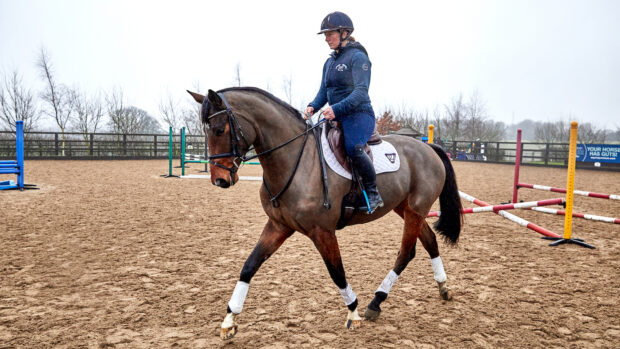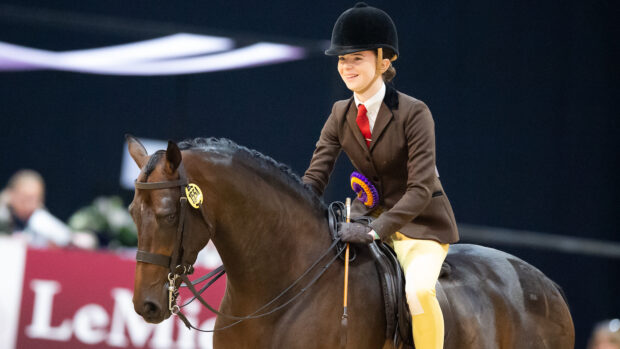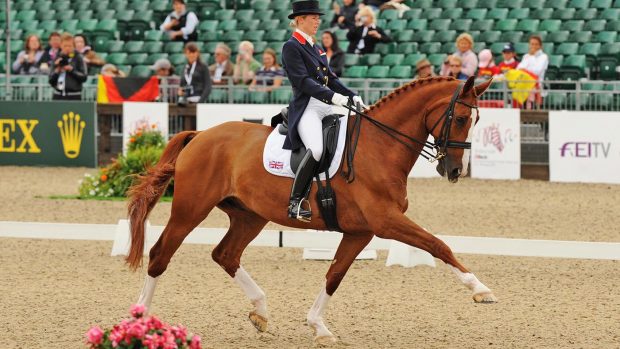Handling horses with confidence doesn’t come naturally to everyone, especially if you have a horse who is tricky to manage or you don’t have the necessary experience. Fortunately, building confidence on the ground is usually a case of increasing competence and expertise, which comes from good guidance and preparation as you tackle this area.
There are degrees of the extent to which you may want to handle a horse from the ground, from leading horses in and out of the field to long-lining horses over poles. Regardless of the level, anyone with anything to do with handling horses needs to be competent. This applies to non-riders, too – for example the parent or other half who is roped in as a helping hand at shows, loading horses to competitions or just on the yard.
Horses soon clock if their handler doesn’t know what they’re doing, and while many may adopt a nannying role themselves, there are plenty that will take advantage. Confidence and competence are key.
Good groundwork is essential, whatever your level of experience, for the safety of the handler, the horse and everyone else on the yard. If a horse is tricky to handle, the best practice is to go back to basics to establish appropriate, safe behaviour. Do not be afraid to seek help from an experienced coach.
Right from the outset, horses should be taught to lead politely, to stop when asked, to wait and to back up. Horses weigh half a tonne, and so you need to establish trust and communication, and set boundaries of personal space, because if they throw their weight around, you are going to be at risk.

Loading horses is part and parcel of handling them, and requires a confident approach. Credit: Philip Barker
4 areas to boost your confidence in handling horses
1. Remember to trust in yourself
Debbie Hill of performance coaching business Ahead for Life says when we are worried about something the conscious mind can become overloaded and people can revert back to the learning stages, but by trusting that you know how to handle a situation, you can focus on the task at hand.
“When learning to drive a car at first you get in the car and you don’t know what you don’t know, that’s called unconscious incompetence,” explains Debbie. “Then you learn about the clutch and gear stick and what you need to do, and that’s called conscious incompetence and you’re aware of what you don’t know.
“Once you pass your test you have reached conscious competence, where you’re aware of what you’re doing but you still need to think about. Then when you reach expert level in something, it becomes unconscious competence, for example you drive to work and don’t really think about how you got there.”

An experienced handler leading a pony – a case of “unconscious competence”. Credit: Philip Barker
“To be able to perform anything really well we need to be in that unconscious competence because we need to be able to trust that we can do it. If you start thinking that something bad is going to happen then you can start believing it, and that’s all emotional thinking.
“You need to change that belief set and trust that you know what you’re doing, and in doing so you move towards logical thinking which allows you to move forward clearly.”
2. Take appropriate safety steps
Five-star eventer and BHSI coach Georgie Goss says simply being prepared and properly equipped for a task can instil confidence around handling horses on the ground.
“When you feel safe, you’re naturally more confident,” she says. “If your horse can be difficult to lead you’re going to feel safer using a bridle or a lunge line instead of lead rope, and wearing a hat and gloves, so you’re putting yourself in the safest scenario.
“If your horse is a bit fresh when turning them out for example and you’re not prepared, that’s often where things can go wrong. If you’re ready for these things, then if they spook or do something silly, you’ve got the right kit from a safety point of view, and you’re going to feel more confident in how to handle that situation.”

Wearing a helmet and gloves is good practice for handling horses on the ground. Credit: Andrew Sydenham
3. Learn to understand horse body language
Tina Canton of Tinderbox Sport Horses, a BHSI, UKCC level three coach, and Centre 10 advanced coach, recommends learning from others and not being afraid to ask for help.
“If you are struggling with confidence then spend some time with someone experienced in handling horses and get them to explain how they are reading them. A lot of people who have major problems on the ground don’t read the horse’s body language, because they don’t really understand it,” she explains.
“They might anthropomorphise and put human emotions onto the horse, but we’ve got to remember that they are herd animals and they read our body language a lot.”

Horses interacting in a herd – understanding the herd instinct can help us understand horses’ behaviour and adapt accordingly. Credit: Alamy
“Some people try to deal with their horses by feeding them titbits or allowing them to run over the top of them and we have to remember that they are half a tonne of animal that could do us damage, so we need to understand how to handle them safely. By doing some research on what is the natural way of a horse, what is their herd instinct, and the owner can start to understand why the horse is reacting in a certain way and adapt accordingly.”
4. Put your CEO hat on
Tina says taking a step back and assessing things from a different perspective can also help.
“When people are lacking confidence with their horses, I ask them to look at how they perform in other parts of their life,” she explains.
“They might have a job where they have to make really big decisions, but when it comes to their horses they turn themselves inside out making decisions about what rug to put on. If you put your CEO hat on, or team leader hat, or whatever that role might be, then consider how you would make a decision if it was another aspect of your life.”
You may also be interested in:

Why do you lack confidence when riding or handling horses? Five questions to ask yourself

Lost riding confidence after having a baby? A confidence coach explains why becoming a parent can affect your equestrian life

Struggling with nerves? Boost your confidence and enjoy riding again with these helpful tips

*Exclusive* Little steps for big results: lead-rein producers share their winning formulae for the show ring’s budding stars





